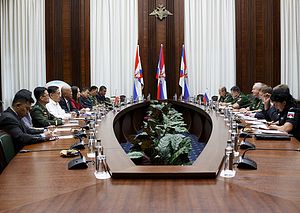This week, Russia appointed its first defense attaché to the Philippines in over 40 years. Though this was a long-mulled symbolic move, it nonetheless highlighted the continuing inroads both sides are making in the defense realm under Philippine President Rodrigo Duterte’s perceived “pivot” to Russia as part of his wider independent foreign policy.
As I have observed previously in these pages and elsewhere, one of the consequences of Duterte’s so-called independent foreign policy since he took office in 2016 has been the diversification of ties that the Philippines, a traditional U.S. treaty ally, has with countries such as China and Russia. As this has occurred, we have seen the slow development of Russia-Philippines defense relations despite the challenges that still exist, including the inking of new defense pacts, visits by vessels on both sides, and the transfer of some military equipment and expertise to meet Manila’s needs.
One of the steps that had been anticipated in the development of Russia-Philippines defense ties was the formal introduction of a defense attaché to the Philippines. While the step was only part of the wider relationship and it had been mulled since last year, the fact that this would be the first time Russia would have such a presence in the Philippines in over 40 years nonetheless meant that the step would receive headlines when it actually took place, following the assignment of a new Philippine defense attaché in Moscow in May 2018.
This week, we saw an advancement in this regard with the introduction of Russia’s first defense attaché to the Philippines. Dmitry Nikitin was unveiled to Philippine military officials and the media on September 3 during the reception of the opening of the Russian Military Attaché Office.
Unsurprisingly, both sides were keen to portray the step as being a significant step in Russia-Philippines ties. Per the Philippines News Agency, Russian Ambassador to the Philippines, Igor Khovaev, described the event as being “quite symbolic and very meaningful” for the advancement of the relationship and also for all regional countries given the common struggles that they faced such as terrorism, while Philippine Defense Undersecretary Raymundo DV Elefante said that though the advancement of ties would be “a very long journey,” this afforded a good opportunity for both sides to advance cooperation and friendship.
To be sure, as I have noted previously, a true assessment of the evolution of Russia-Philippines defense ties under Duterte ought to come with a sober evaluation of its collective substantive gains over time, rather than a focus on individual symbolic moves as they occur for their own sake. Nonetheless, we can expect both sides to play up inroads within the wider defense relationship as they continue to develop this aspect of ties.
































